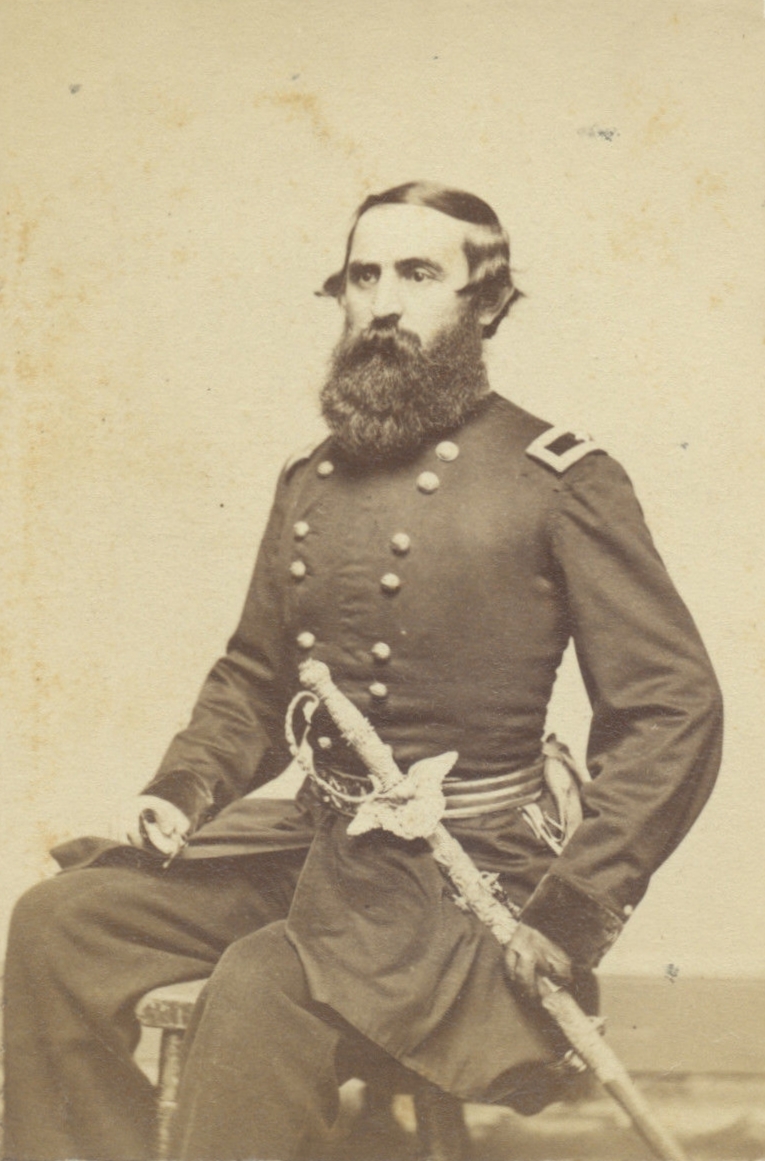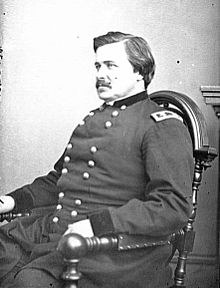The Other Rock of Chickamauga?

One of the joys of research is turning an unexpected corner to find out something new. That happens every so often, and when it does, I always get a little buzz of excitement. Most recently, that buzz came when I stumbled across the name William W. Burns in the official records.

Now, Brigadier General William Wallace Burns was not exactly completely unknown to me: I knew he was a brigade commander in the Army of the Potomac in 1862, serving in the Second Corps under generals Sedgwick and Sumner; and later, a divisional commander in the Ninth Corps during the Fredericksburg campaign. He distinguished himself as a first-rate leader and capable fighter in the Seven Days’ battles of Savage Station and Glendale. He took a severe face wound at Glendale, not returning to the army until the fall, when he was stepped up to divisional command.
But I was surprised to see him mentioned in a January 1863 dispatch sent by Union Major General William Starke Rosecrans to the War Department, inquiring about Burns’ availability for a command in the west. Burns was one of “several good officers” Rosecrans desired to have join his own command, the Army of the Cumberland.
Interesting.
However, despite the request, Burns never joined Rosecrans, nor held a significant command in the west. As a matter of fact, Burns never again held a significant command anywhere, for the duration of the conflict. Why not?
There seemed to be a mystery here. A quick consult of the basic sources (Generals in Blue and the Eichers’ Civil War High Commands) revealed that Burns in fact resigned his volunteer commission in March 1863, reverting to his regular army rank and duties. He was assigned as a commissary officer in the Department of the Northwest, as about as far from the war has he could be sent. Ezra Warner (Generals In Blue) concluded that Burns “evidently preferred administration to field command.” Faint praise indeed.
The reality is quite a bit different.

Burns was apparently eager to head west, mainly because, according to Burns, Rosecrans offered him a corps command, intending to replace Major General Alexander McDowell McCook, the unfortunate leader of the Union Twentieth Corps, with Burns. This is surprising, since, despite difficult moments at both Perryville and Stones River, Rosecrans has generally been viewed as a McCook supporter during this time-frame – the winter and early spring of 1863.
But Rosecrans was also seeking top talent at this time, requesting several officers by name. David S. Stanley and Julius P. Goresche, for example, were both singled out by the new army commander. Burns was in this category. Burns served on McClellan’s staff – and alongside Rosecrans – in West Virginia, in the fall of 1861. Clearly Rosecrans tagged him as another talented individual.
To replace McCook, however, Burns needed a second star. As a one-star, he would be outranked by too many other generals in the Army. This shouldn’t have been a problem, since Burns’ name was supposed to have been placed on the roster of officers due promotion, dated November 29, 1862, that was supposed to go before Congress for approval.
But Burns name never made the list. Stung, he politicked to find out why, and to have the oversight corrected. As an Ohioan, he wrote to Senator John Sherman and contacted Cabinet Secretary Salmon P. Chase, among others, to agitate on his behalf. Burns also visited Secretary of War Edwin M. Stanton, where – again according to Burns – he received a personal assurance that he would be promoted.
When the published list of promotions came out that March, however, Burns was not on it. He blamed Stanton, who he felt betrayed him as a form of revenge due to the fact that he was a McClellanite, and the Army of the Potomac was in political turmoil that spring.
Had Burns seethed in private, and simply reported to Rosecrans as a brigadier, he would likely have received a division, and in due time, might well have risen to a corps. Instead, however, in a fit of public pique, Burns wrote a blistering letter of resignation and submitted it to President Lincoln. Burns expected Lincoln to investigate the matter and put things to rights. Instead, Lincoln, who by now was doubtless fed up with self-important generals, accepted the resignation.
And that was that. Burns reverted to his permanent rank and was sent packing. His star, previously rising so precipitately, flared out. The official Record shows that Rosecrans asked after him at least once more, in March, inquiring as to whether the resignation would be effective, and if something could not be done to reverse the situation. Nothing was.
In later years, Burns continued to politic for an answer. He wanted the War Department to investigate why Stanton supposedly derailed his career, but no one ever produced any evidence supporting that allegation.
But that didn’t stop Burns from speculating. He continued to believe that not only would he have received command of the Twentieth Corps, but also that had he been leading that corps at Chickamauga, Rosecrans would have not suffered a defeat. In 1890, near the end of Burns’ life, he expressed his thoughts in a letter to Henry Cist, one of Rosecrans’s former staff officers and a chronicler of the Army of the Cumberland’s exploits:

“My claim to an interest is a sad one. I was to have been in that campaign, and Rosecrans wrote ‘the War Dept. failed to support me [by] preventing Genl Burns from joining me. Had I been able to use his services as intended . . . we should have fought the battle on our instead of their [the Confederates] chosen ground.’ Sheridan told me that had I been there . . . the battle would have ended differently.”
These digs were clearly aimed at McCook: for after the war many Rosecrans partisans blamed McCook for being slow to join the army in the days before Chickamauga, forcing Rosecrans to wait for him to catch up and thus, letting Bragg chose where to fight.
Of course, Burns wasn’t there. History is full of such might-have-beens, though usually they are about men struck down in combat: What if Jackson recovered from his Chancellorsville wound, if Phil Kearney not been killed at Chantilly, if Joshua Sill survived Stones River, etc.
Burns was different, his career struck down in effect by his own hand – an action he lived to almost certainly regret.
More detail concerning William Wallace Burns and his travails can be found here.
Dave
Great post as always. I confess that I had to look Burns up; I’d heard the name before but that’s about all. Along the same lines, after John Schofield’s very brief time as a division commander in the AoC before being sent back to Missouri, Rosecrans wrote him and said that he had looked at Schofield as a potential corps commander. It certainly does appear that Old Rosey was looking to upgrade the senior command of the Army of the Cumberland.
He also wanted Buell. If so, it could only have been as a corps commander; Buell was too senior for anything else.
Excellent article.
The naked ambition of Civil War generals never ceases to amaze me. A wonderfully researched article. Thank you.
Burns was nominated to a major generalcy on 12 February 1863, the day he visited Stanton. The nomination went by the board, because the senate failed to act upon it. Lincoln had nominated more officers to major general than congress was willing to appropriate.